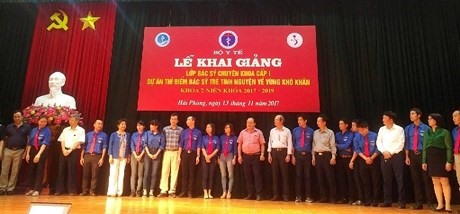 Society
Society

A medical specialist training programme was launched in Hải Phòng City on Monday for 19 medical graduates who volunteer to go work in remote localities of the country.
 |
| A medical specialist training programme has opened in Hải Phòng City for 19 medical graduates who have volunteered to work in various remote localities in the country.— Photo VGP/Thúy Hà |
HÀ NỘI — A medical specialist training programme has opened in Hải Phòng City for 19 medical graduates who have volunteered to work in various remote localities in the country.
The programme, launched on Monday, will train the young volunteers for two years in seven specialties: internal medicine, surgery, obstetrics, pediatrics, anesthesia, diagnostic medical imaging and infectious diseases at the Hải Phòng University of Medicine and Pharmacy.
The graduates were chosen by the Ministry of Health (MoH) based on outstanding academic performances.
The training programme is part of a pilot project, started by the ministry in 2013, that sends medical graduates to disadvantaged areas, including mountainous regions, border areas and islands.
It was prompted by a shortage of about 600 medical specialists in 62 poor districts of the country, according to Dr Phạm Văn Tác, project director as well as director of the ministry’s Department of Organisation and Personnel.
“Some hospitals in the mountainous districts of the Lai Châu, Sơn La, Cao Bằng and Hà Giang provinces only have four to five doctors; and some don’t have any,” he told the Hà Nội Mới (New Hà Nôi) newspaper.
“Meanwhile there are about 140 doctors in just a single district in Nam Định Province. It’s a huge discrepancy,” he said.
After getting project approval in February 2013, over the last three years, the ministry has collaborated with the Hà Nội Medical University to organise five training programmes for 78 medical graduates who volunteered to work in 37 poor districts across 13 provinces.
The 78 chosen were medical students who’d graduated with distinction and volunteered to join the project, said Associate Professor Nguyễn Đức Hinh, principal of Hà Nội Medical University.
These students will work at central hospitals for a short period of time before joining a two-year specialist training programme, after which they will be considered “doctors”, and sent to work at district-level hospitals in poor provinces for four years (men) and two years (women), he added.
“After that they get to choose whether to go back to the central hospitals where they previously worked, or transfer to local hospitals in their hometowns,” he said.
In July, the first seven medical volunteers who completed their training were sent to Lào Cai Province’s Bắc Hà and Mường Khương districts, Sơn La Province’s Sốp Cộp District, Bắc Kạn Province’s Pác Nậm and Ba Bể districts, and Điện Biên Province’s Mường Nhé District.
Gaining experience
Soon after he was sent to the Bắc Hà General Hospital, surgeon Nguyễn Chiến Quyết, 28, performed an endoscopic surgery on a Mông man suffering from appendicitis.
“I hadn’t had much experience at that time and hadn’t even got used to working with my colleagues. But luckily the operation turned out fine,” Quyết told the Nhân Dân (People) newspaper.
“From then on, I was determined to apply to the fullest what I had learned in school to take care of the local people here,” he added.
The young doctors have anticipated the struggles and difficulties that come with working in remote areas among ethnic minority people whose languages they were not familiar with, said Trần Thị Loan, a female doctor from that first batch of seven, who was sent to the Mường Khương General Hospital in Lào Cai Province.
“I got used to them after a while,” she said. “Now I’m confident that I’ll ‘nail’ my two years of duty here.”
Long-term effectiveness
Despite the well-meant intention to alleviate doctor shortages, directors of many local health departments have raised concern over the project’s effectiveness in the long run, said project director Dr Phạm Văn Tác.
“Some say that two to three years are too short for the medical volunteers to actually improve their skills and help increase healthcare quality at district-level hospitals. Not to mention the ‘gaps’ left by these doctors when they fulfill their duty and leave,” he said.
The MoH will reconsider the duration of deputation, starting with the next batch of medical volunteers, Tác said. It will also work to retain them in the poor districts, he added.
The ministry will also consider providing specialist training for local doctors in the poor areas so that they can fill up the spots left by the volunteers, he said.
The project expects to send 300-500 doctors to 62 disadvantaged districts by 2020. — VNS




